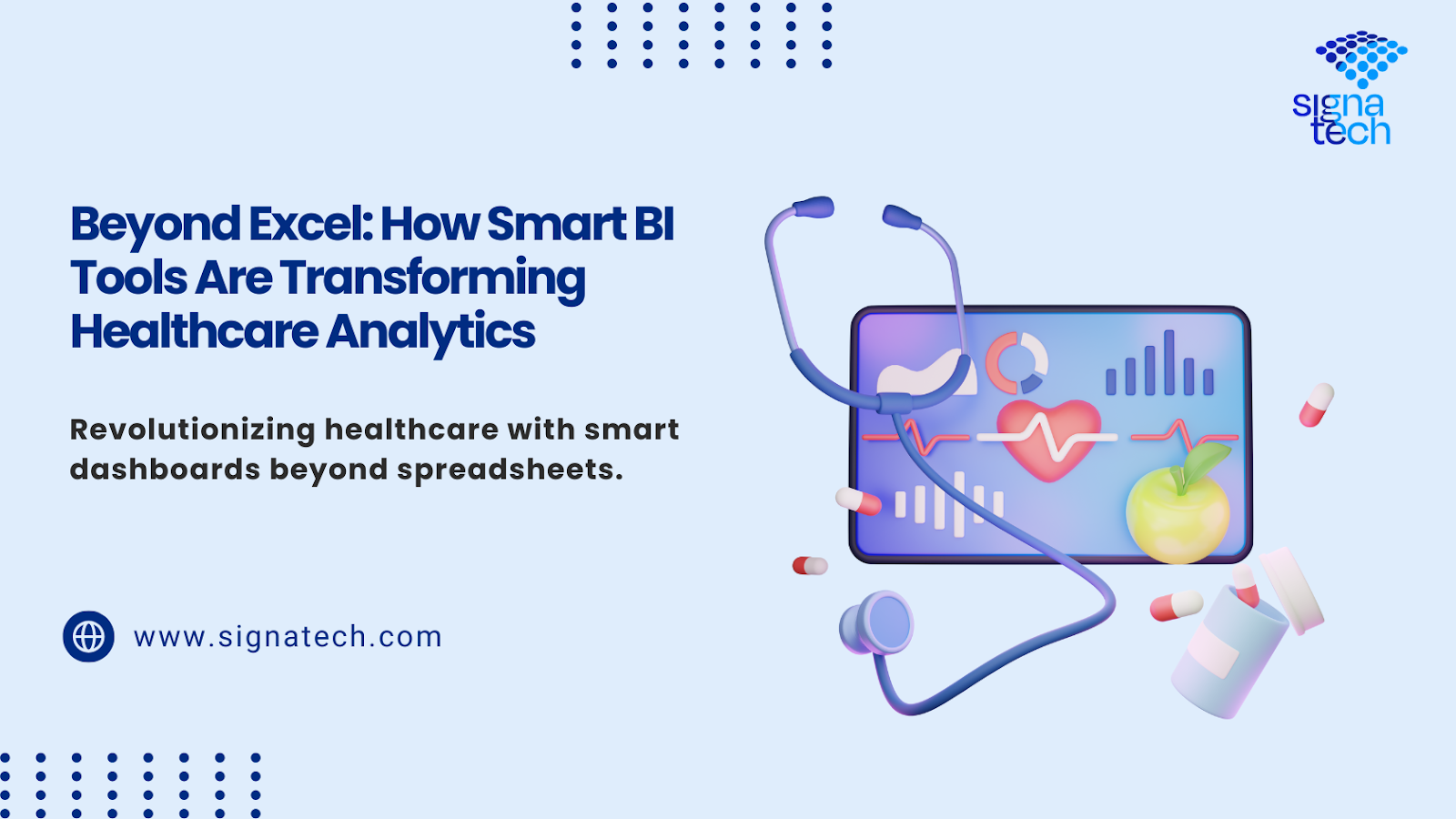For many years, hospitals and healthcare organizations used Excel sheets and manual reports to keep track of patient data, financials, and operations. As the healthcare industry is becoming more complex and more data is being generated, manual processes no longer suffice.
Today, innovative healthcare leaders are utilizing Healthcare Data Analytics with Business Intelligence (BI) tools. Moving away from static spreadsheets to smart and dynamic dashboards is transforming clinical, operational, and financial decision making.
In this blog, we will describe why this transformation is important and how healthcare organizations can leverage their data in effective ways.
The Data Explosion in Healthcare
The healthcare industry generates massive amounts of data every day:
- Electronic Health Records (EHRs)
- Patient monitoring systems
- Diagnostic imaging
- Lab results
- Claims and billing data
- Inventory and supply chain records
- Financial and administrative data
Yet, much of this data remains siloed and underutilized.
Traditional spreadsheets struggle to handle such large, diverse data sets. They’re error-prone, static, and hard to scale which limits the insights available to decision-makers.
That’s where Healthcare Data Analytics and BI come in.

#image_title
What is Healthcare Business Intelligence?
Healthcare Business Intelligence (BI) refers to the use of advanced data analytics, visualization, and reporting tools to turn raw healthcare data into actionable insights.
Instead of navigating endless spreadsheets, healthcare leaders can view interactive dashboards that provide a real-time pulse on:
- Patient outcomes
- Financial performance
- Resource utilization
- Operational efficiency
- Quality and compliance metrics
Smart dashboards make it easy to slice, filter, and drill down into the data empowering faster, more informed decisions.
Why Healthcare Organizations Are Moving to BI Dashboards
The benefits of adopting BI tools and smart dashboards are significant:
Real-Time Decision-Making
With BI dashboards, stakeholders can leverage live data versus stale reports. With current information, they can make immediate adjustments in staffing, bed usage, inventory, and patient flow.
Improved Patient Outcomes
By analyzing clinical data, healthcare providers can identify trends, monitor population health, and personalize treatments leading to better outcomes.
Financial Optimization
By utilizing clinical data, healthcare providers can assess trends, monitor population health, and personalize treatment regimens, ultimately leading to better outcomes.
Enhanced Regulatory Compliance
Healthcare BI allows leaders to identify cost-drivers, revenue leakages, and eliminate inefficiencies (in a healthcare organization). Leaders can optimize operations, eliminate wasted resources, and optimize margins.
Cross-Departmental Collaboration
Dashboards can track KPIs associated with regulatory standards to assure an ongoing and continuous commitment to compliance along with avoiding penalties for lack of compliance.
Key Use Cases of Healthcare Data Analytics
Below are some of the ways in which healthcare organizations are leveraging BI and Healthcare Data Analytics:
- Clinical Performance Monitoring: Monitor infection rates, readmissions, effectiveness of treatment and rates of satisfaction.
- Population Health Management: Analyze determinants of health, chronic diseases, risk factors of patients.
- Revenue Cycle Improvement: Visualize revenue trends, account for billing errors, reduce the number of days in accounts receivable.
- Resource Management and Capacity Planning: Monitor in real time bed occupancy, staffing ratios, and equipment levels.
- Supply Chain Management: Monitor and maintain inventory levels, forecast demand and prevent stock outs and overstocking.
- Operational Effectiveness: Review Workflow to identify areas to eliminate bottlenecks in processes.
Why Spreadsheets Are No Longer Enough
Relying on spreadsheets in today’s data-rich healthcare environment leads to:
- Delayed decision-making due to manual reporting
- Incomplete or fragmented data views
- Increased risk of errors and compliance violations
- Inability to analyze large, complex data sets
- Limited collaboration between departments
On the other hand, modern BI platforms provide:
- Integrated data from multiple sources
- Automated data refresh and real-time insights
- Advanced visualizations that tell a clear story
- Scalable architecture that grows with your needs
- Secure access and governance controls
Building a BI-Driven Healthcare Organization: Best Practices
Here’s a path forward to shift from spreadsheets to intelligent dashboards:
1. Start with Business Goals
Begin with clear objectives: improve patient outcomes, operational enhancement, reduce costs, or compliance.
2.Identify Key Data Sources
Identify your data ecosystem: Where is the data? EHR, financial, supply chain, CRM, etc.
3.Choose the Right BI Platform
Choose scalable, healthcare compliant BI, and correct BI tools. Common BI Platforms are Power BI, Tableau, Qlik, and Looker.
4. Implement User-Friendly Dashboards
Create dashboards that are intuitive, designed for specific users or groups of users (i.e. clinical staff, executives, financial group).
5. Foster a Data-Driven Culture
Provide user training, advance data fluency, and include data analytics in the workflow.
The Road Ahead: Smart Healthcare with BI
The move to Healthcare Data Analytics and BI is no longer optional. It’s a strategic imperative.
Organizations that embrace BI can:
- Deliver higher-quality, personalized patient care
- Run more efficient, financially sound operations
- Stay ahead of compliance requirements
- Compete effectively in a rapidly evolving market
Those that remain stuck in spreadsheet culture risk falling behind.
Partner with Signatech for BI Success
Creating a powerful BI-driven healthcare organization requires the right skills and strategy.
Enter Signatech’s Business Intelligence consulting services.
We help healthcare providers:
- Audit and integrate data sources
- Design and implement modern BI solution
- Develop custom dashboards tailored to healthcare KPIs
- Foster adoption across clinical and business teams
- Ensure scalability, security, and compliance
If you’re ready to move beyond spreadsheets and unlock the full power of your healthcare data, let’s talk.
Contact Signatech today to explore our Business Intelligence consulting services for healthcare.
Together, we’ll help you turn data into better decisions and better care.
